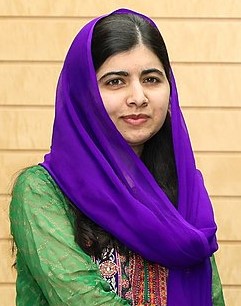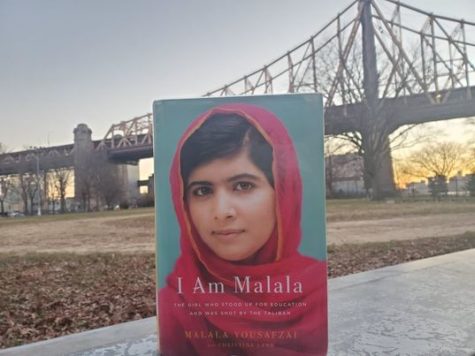Malala’s Extraordinary Journey: From Targeted Activist to Happily-Married Spouse
Malala Yousafzai, 24, marries Asser Malik, a board member of Pakistan’s Cricket Council. Seven years prior, Malala received the Nobel Peace Prize award for her activism in women’s rights to education after being shot by the Taliban in 2012 when she was 15.

内閣官房内閣広報室 (Japanese Public Relations Office) / Wikimedia Commons
Malala Yousafzai got married on November 9th, 2021 to Asser Malik, a general manager of the Pakistan Cricket Board’s High Performance Center. Just a few months prior in July, Malala had said, “I still don’t understand why people have to get married. If you want to have a person in your life, why do you have to sign marriage papers, why can’t it just be a partnership?” Malala overcame overwhelming difficulties, such as advocating for widespread education in a hostile environment and being shot by the Taliban as a result, but her marriage is a testament to her conquering those tribulations.
Just like many other high school students, the then seventeen-year-old Malala Yousafzai was completing a lab experiment for her chemistry class. A few minutes go by, and unlike any other high school student, Malala receives the Nobel Peace Prize, making her the youngest recipient.
Born and raised in Mingora, Pakistan, Malala realized that her home country was an unwelcoming environment for girls, who are strongly discouraged from attending school. “Despite the culture there at the time, her father loved the fact that he had a daughter and not a son,” said Daniel Kim ’24.
When Malala came of age and began to see the injustices in her country, she advocated that everyone, regardless of sex, deserves the right to education.
At the time, the Taliban, a military group of Islamic Fundamentalists, occupied Pakistan. They seek to attain absolute incorporation of Sharia law, the Islamic legal system. Among the Taliban’s aspirations are blockading females’ education rights. Their reasons for this range from their belief in “traditional” gender roles to their desire to ensure that no woman is smarter than a man.
“There were members of the Taliban out in the streets who would beat women if they weren’t wearing burqas. It was a terrible atmosphere to be in and extremely unsafe for young women like Malala,” said Cecilia Beauchamp ’25, who took a deep found interest in Malala’s memoir entitled ‘I am Malala.’ “I loved reading her book so much,” said Beauchamp.
Malala, as per her resilient activism in the face of inequality, blatantly disobeyed the Taliban’s wishes. “It’s extremely admirable, because even though it was so dangerous, she risked her life to stand up for what she believes in,” said Beauchamp. Because Malala advocated for males and females to have equal access to education, she quickly became a prime target of the Taliban.
As a result, in October of 2012, while she was returning home after completing an examination, Malala took the bus and noticed that a heavily masked and armored man with a firearm had boarded the bus. He looked around and asked, “Who is Malala?” Seconds later, the man, a Taliban member, shot her and ran out of the bus.
After she was shot, Malala was quickly taken to Birmingham, England, and transferred to the Queen Elizabeth Hospital. “After she was shot, she was brought to a hospital in Birmingham where she got a successful surgery on her skull. Her family wasn’t even able to go with her to England when she first was admitted to the hospital, because the family didn’t have the documents they needed,” said Beauchamp.
The surgeons responsible for treating Malala removed the bullet that had driven through her skull’s thinnest bone. After 72 hours of meticulous work, the surgeons deemed that the bullet had not been fatal and that Malala had not suffered any major brain damage nor any substantial nerve damage.
After Malala’s family arrived in the country, they moved into a house in the West Midlands region of England. During rehabilitation there, news of her story spread immensely. The documentary, ‘He Named Me Malala’ was released, and it told the story of Malala and the events that led to her coma.

Also during this time, Malala wrote the book, ‘I am Malala.’ The memoir tells of experiences that shaped Malala and how her bravery allowed her to spread her message that women deserve to have an education.
“Malala starts the book by giving context to herself and the people around her. She was constantly reassessing her security every day and staying out of trouble as much as possible. If the Taliban saw any girl disobeying their ideals, they would be tortured. Malala was hesitant to fight against the Taliban. Yet, she is truly passionate about this cause, enough to openly promote it despite the risks,” said Kyle Kaplan ’25.
The culmination of her bravery and activism resulted in her winning the Nobel Peace Prize of 2014, which she shared with Kailash Satyarthi, a civil rights activist from India.
Even with her widespread recognition, Malala is still able to go about her regular life. This past June, she graduated from Oxford University with a degree in politics, economics, and philosophy.
On November 9th, 2021, she married Asser Malik, who is a general manager of the Pakistan Cricket Board’s High Performance Center. Malala shared some details about her nikkah with Malik. A nikkah is the Islamic legal contract between two people ensuring that they marry each other out of their own free will.
Being an inspirational figure signifies that a person can be a role model for others, teaching them how to lead their lives. Beauchamp declares that “[Malala] has every right to marry and do what makes her happy.” Beauchamp further says that Malala’s example is inspirational and one of hope. “Work as hard as you can, and don’t give up no matter how hard it gets; it will get better. You just have to be patient and work towards it,” said Beauchamp.
Malala was able to overcome a tremendous tribulation, and she can now enjoy a happy life. Several prominent figures, such as Priyanka Chopra, Greta Thunberg, and Justin Trudeau, congratulated Malala on her momentous day. We all can wish well on her as she continues to be an influential role model for people all over the world.
Dear Malala, congratulations on your marriage!
To watch the documentary ‘He Named Me Malala’ on Amazon Prime (rental fee required), click HERE.
“It’s extremely admirable because even though it was so dangerous, she risked her life to stand up for what she believes in,” said Cecilia Beauchamp ’25.
Shahabir Sami is an Editor-in-Chief for the 'The Science Survey.' As an Editor-in-Chief, Shahabir provides the third and final overall edit for his peers’...










